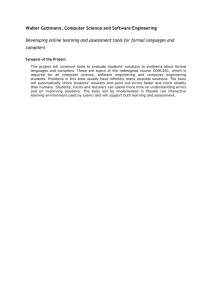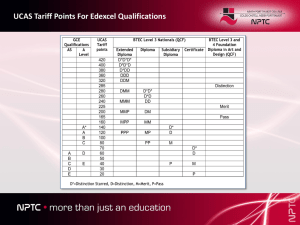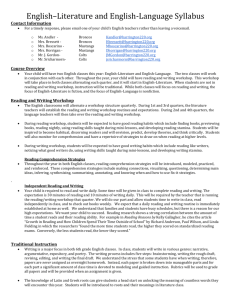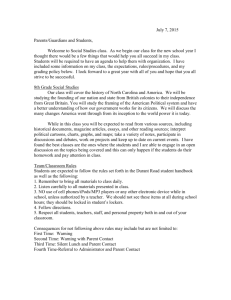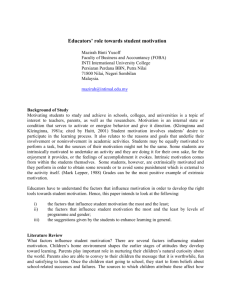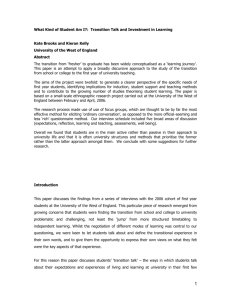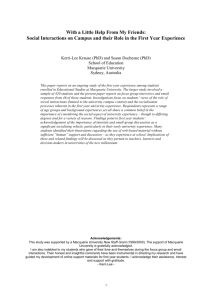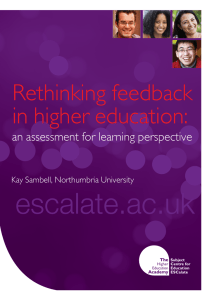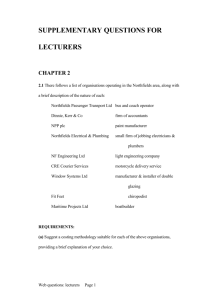Making the Most of Feedback
advertisement
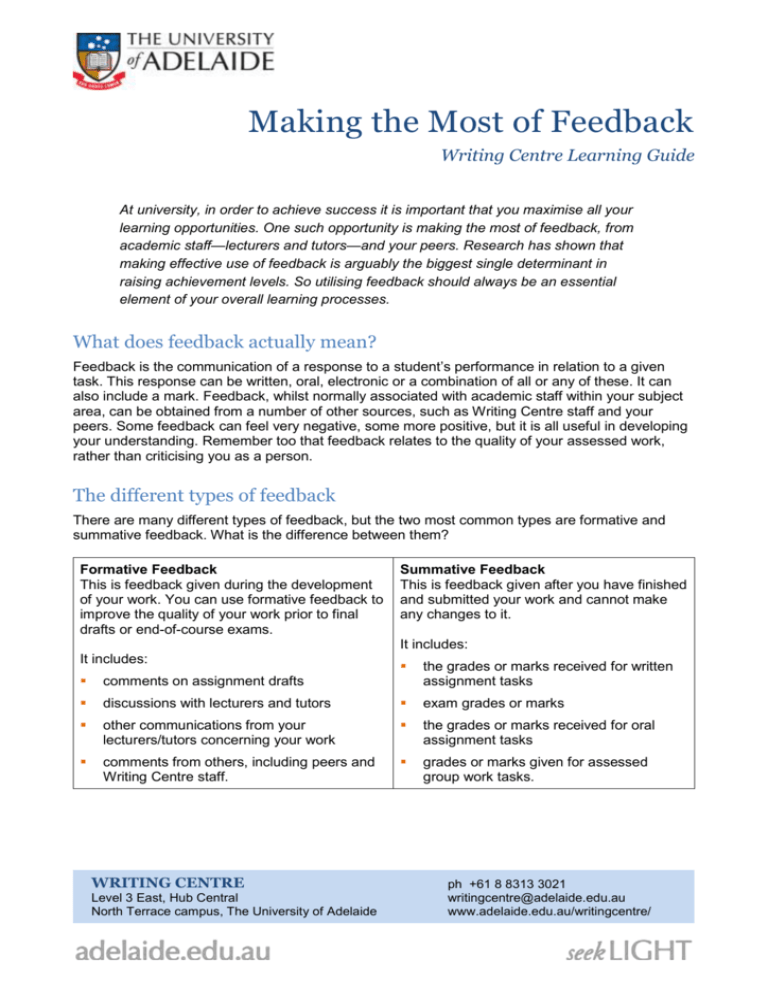
Making the Most of Feedback Writing Centre Learning Guide At university, in order to achieve success it is important that you maximise all your learning opportunities. One such opportunity is making the most of feedback, from academic staff—lecturers and tutors—and your peers. Research has shown that making effective use of feedback is arguably the biggest single determinant in raising achievement levels. So utilising feedback should always be an essential element of your overall learning processes. What does feedback actually mean? Feedback is the communication of a response to a student’s performance in relation to a given task. This response can be written, oral, electronic or a combination of all or any of these. It can also include a mark. Feedback, whilst normally associated with academic staff within your subject area, can be obtained from a number of other sources, such as Writing Centre staff and your peers. Some feedback can feel very negative, some more positive, but it is all useful in developing your understanding. Remember too that feedback relates to the quality of your assessed work, rather than criticising you as a person. The different types of feedback There are many different types of feedback, but the two most common types are formative and summative feedback. What is the difference between them? Formative Feedback This is feedback given during the development of your work. You can use formative feedback to improve the quality of your work prior to final drafts or end-of-course exams. Summative Feedback This is feedback given after you have finished and submitted your work and cannot make any changes to it. It includes: It includes: the grades or marks received for written assignment tasks discussions with lecturers and tutors exam grades or marks other communications from your lecturers/tutors concerning your work the grades or marks received for oral assignment tasks comments from others, including peers and Writing Centre staff. grades or marks given for assessed group work tasks. comments on assignment drafts WRITING CENTRE Level 3 East, Hub Central North Terrace campus, The University of Adelaide ph +61 8 8313 3021 writingcentre@adelaide.edu.au www.adelaide.edu.au/writingcentre/ Why is feedback so important? It helps you identify where you are going wrong (or right!) in relation to a particular course, so you can target course expectations better in the future. It can have immediate use to help inform your next draft or assessed task (aka feeding forward). It can help you focus on issues beyond the grade you receive. It relates to the development of qualities useful both in an academic context and beyond. Maximising the benefits of both formative and summative feedback “All feedback is useful” It is important not just to value the feedback you get from your lecturers and tutors. Your peers and ALL staff can also give you valuable insights. “From surface to deep learner” Feedback can help define your strengths and weaknesses. When you reflect upon and then act upon the feedback, you are taking an analytical approach to developing your learning. This is a deep learning approach over and above a focus on grades and is more likely to help you sustain longer term success. “Don’t take it personally” Feedback is given to help you develop and improve your work, so try not to be over-defensive about critical feedback. See such feedback as an incentive to improve. “Say thanks for feedback” Show appreciation to the person who gives you positive feedback - they are then more likely to do it again at another time. Even when you receive critical feedback, acknowledge the person who gave it and show how you intend to act on the feedback in a later draft or assignment. “Don’t dismiss the positive” It is tempting to skim over positive feedback and not to take sufficient notice of what you did well. You need to know what to replicate in your next assignment task. “Be proactive about feedback” Don’t always wait for feedback to come your way. Be proactive about approaching different people for their feedback. This will be seen as a positive desire to improve your work. “Match your feedback” Check that the feedback you receive correlates with your grade. If you feel there is a mismatch, then ask for further clarification of the assessment criteria. Decoding feedback The language of feedback can sometimes be rather brief. However, it is important for you to be able to make sense of the feedback given. Some common feedback comments are explained below: ‘What do you think about the issue?’ or ‘Why are you telling me this?’ These comments suggest that you have put forward a lot of content related elements from external sources but have not included your own position. In other words you are merely reporting on the work of others, not integrating their work around your own argument. 2 ‘Your argument needs to better substantiated’ This means that while your argument might be a relevant one, you need to show research evidence from your readings which support the idea or theory. ‘Observations are not enough’ Here you are being asked to extend what you have observed or experienced, perhaps in an everyday situation, to relevant theory. This can involve consideration of whole theories or just the relevant parts. ‘Get to the point’ This means that what you are saying doesn’t seem to lead to or follow on from anywhere. In other words, the reader cannot see any clear and concise connections; you are talking around the subject. ‘More depth of coverage is needed’ What this means is that you have only superficially examined the issue(s). You need to be more analytical and consider the issue(s) from different perspectives such as strengths and weaknesses, alternative positions, impacts and scope. ‘Your sources are too limited’ Such a comment indicates that you need to have done a wider literature search. It is important to synthesise a number of sources and put them together into a whole that makes sense to the reader in the context of your work—drawing upon one or two sources is seldom enough. Being proactive about feedback At university, you might find that the amount of feedback received from academic staff is less than you were used to in previous learning experiences. Many lecturers have large classes and a substantial amount of work to assess and, while they might want every student to get detailed feedback on their work, the practicalities don’t always allow for this. However, this doesn’t mean that because you haven’t received detailed feedback, you won’t get more details if you do ask for them. So, if you want more feedback, ask for it, but ask for it in such a way that shows your desire to improve your overall work quality in future. Lecturers and tutors will often respond more favourably when such requests are learning focussed rather than focussed on improving your grades. If you don’t get what you ask for If your lecturer is either unable to provide the detailed feedback you want, or unable to explain some elements of their feedback comments that you don’t understand, you do have other options: Talk to a staff member at the Writing Centre. Talk to your peers who might have had similar experiences and could be able to help you. Staging when you receive feedback is something else to consider. Think about who could give you feedback and when. In other words, feedback is not just something you receive at the end of the process (i.e. post assessment); it can be more a case of feed forward during the development of your work. Responding to feedback The benefit you get from feedback is not normally the ‘quick fix’ variety. If you are going to get the most from feedback, like any other learning opportunity, take time to reflect upon how feedback can help improve your work—not just for the task in hand, but for all your future assessed work. There are a number of strategies you can utilise to help you respond more effectively to feedback. 3 Strategy Comment Stay cool If you receive a low mark or grade, don’t be tempted to throw your work away without reading the feedback. All feedback is of value, so make sure you read it, even if you are feeling defensive. Feedback portfolio Keep a central record of feedback received for different assignment tasks. Regularly examine it for any areas or themes which are consistently a problem for you. If you find problems, act on them. Negative into positive If you get a low mark or grade, don’t see it as the end, rather see it as a learning opportunity. What is most important is to see why you got such a low score and to act upon it. Take five If you get a poor mark or grade, take time out before you look at the feedback. It is important to get the most from the feedback; if you are ‘shocked’ by your score then you might not be in the best frame of mind to take in the feedback element. Prioritise and act Determine what the most important feedback related areas are for you to work upon. Prioritise these areas and take appropriate action. Where this involves other people, make sure you leave enough time for arranging/rearranging appointments. Assessment criteria check If you’ve done well, find out exactly where you’ve done well to help you do it again next time. If you’ve not done so well, find out why not and work on the area(s) for next time. If you are not sure about the assessment criteria, ask. Mix’n’match Look at the feedback on the work of your peers and get them to have a look at feedback you have received. Often emotional detachment can help you make sense of feedback, so you can end up helping each other. Further strategies for getting feedback to work for you To gain maximum benefit from feedback it is a good idea to reflect on your feedback preferences which include both types and channels of feedback. A chapter by an academic, Phil Race from the UK, called Building on feedback includes a number of different activities to enable you not only to reflect on such preferences but also to become better at receiving feedback, both positive and more critical. He also provides a lot of other information and suggestions which can help you maximise the benefits of feedback. The chapter is available at: http://phil-race.co.uk/students/; click on the Zip file link called Building on feedback. Useful resources The learning guide Learning at University gives further information on how utilising feedback is an essential part of becoming an independent learner. There are a number of other related resources below that can provide you with more information about including feedback as an integral part of improving your learning. http://w3.unisa.edu.au/academicdevelopment/assessment/feedback.asp http://www.enhancingfeedback.ed.ac.uk/ www.bioscience.heacademy.ac.uk/ftp/resources/shortguides/feedback.pdf © The University of Adelaide 2014 4
